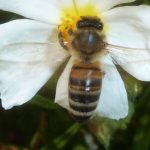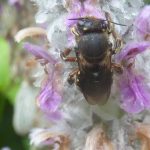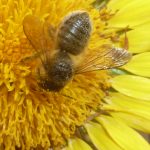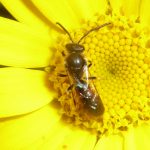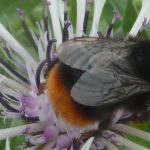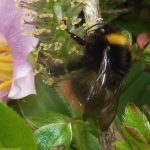According to Horticulture Week, one-third of world food production and 87.5% of all flowering plant species on Earth depend on pollinators. Albert Einstein is credited with saying, “If the bee disappears from the surface of the earth, man would have no more than four years to live”.
Bees are disappearing from the face of the earth. In Britain, two bumblebee species (the apple bumblebee and Cullum’s bumblebee) became extinct in 1864 and 1941 respectively, as well as three solitary bee species. A third bumblebee species, the short-haired bumblebee, became extinct in the UK in 1989 but was reintroduced to a former site in Kent in 2013 by the RSPB and Bumblebee Conservation Trust.
- P1350596m Honey Bee Apis mellifera on Cistus
- P1370553 Wool Carder Bee Anthidium manicatum on Stachys byzantina
- P1210443m Leafcutter bee Megachile willughbiella
- P1220436m solitary bee Lasioglossum calceatum on Corn Marigold Glebionis segetum
- P1180539 Red tailed Bumblebee Bombus lapidarius on Centaurea
- P1170113m Early Bumblebee Bombus pratorum on Salix
One reason for the decline of bumblebees, honey bees and other pollinators is the use of pesticides. Three neonicotinoid pesticides, which have been blamed for killing bees because they are absorbed by the plant and can be found throughout the plant including the pollen and nectar that the pollinators feed on and collect, have recently been banned by the EU for two years.
Why not consider buying organically grown plants for your garden? These will not have been treated with harmful pesticides.
Download the RHS lists of plants for pollinators from here.
These web pages have information about making bee hotels:
http://www.buglife.org.uk/getinvolved/gardening/beenestsforgardeners
http://www.foxleas.com/bee_house.htm
http://www.nhm.ac.uk/kids-only/things-to-make-and-do/bee-hotel/
http://www.bwars.com/index.php?q=information_sheets [download “Bee Hotels”]

